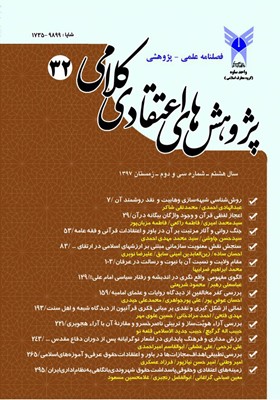الگوی مفهومی واقع نگری در اندیشه و رفتار سیاسی امام علی (ع)
محورهای موضوعی : کلام اسلامیعباسعلی رهبر 1 , محمود شریعتی 2
1 - 0
2 - دانشگاه علامه طباطبائی
کلید واژه: نظریه اسکینر, عقلانیت, آرمانخواهی واقع بینانه, کرامت انسانی, حق انتخاب. ,
چکیده مقاله :
رابطه دین و سیاست در اندیشه امام علی(ع) رکن وجودشناسانه و قوام بخش در مناسبات جامعه و حکومت بوده است. اما این چارچوب در تقارن با الگوی واقع نگری در دستگاه فکری امام، به عنوان مفهومی، اثربخش در ایجاد مشروعیت، مشارکت و پیش برندگی در نظام سیاسی قابل طرح، فهم و نشانه گذاری است. در پرتو این چارچوب، فرایند مفهوم سازی واقع نگری با تکیه بر عقلانیت در دو سطح اندیشه با تأکید بر مفاهیمی چون کرامت انسان، حق انتخاب آدمیان، اجرای عدالت و ضرورت حکومت؛ و در سطح رفتار با تأکید بر کنش سیاسی امام در تعیین خلیفه، پذیرش حکمیت و همزیستی با ادیان، صورتبندی خواهد شد. این نوشتار کوشش خواهد نمود با به کارگیری نظریه تفسیری اسکینر، به دو هدف مهم دست یابد: از سویی مفهوم واقع نگری در اندیشه و رفتار امام علی(ع) قابل فهم گردد و از سوی دیگر، اثربخشی واقع نگری در توازن بخشی و انسجام آفرینی نیروهای اجتماعی مورد سنجش قرار گیرد. بدیهی است دستیابی به این اهداف، مستلزم پیاده سازی گستره ای از مفاهیم و موضوعات خواهد بود. در نتیجه، برای فهمیدن چارچوب بحث طرح چند مسأله حائز اهمیت است. 1) پیوست واقع نگری به عقلانیت 2) نسبت سنجی واقع نگری با آرمانخواهی 3) مفهوم سازی واقع نگری 4) موقعیت سنجی شرایط محیطی و زمینه های اجتماعی جامعه هدف.
The relationship between religion and politics in the thought of Imam Ali has been an ontological and consistency column of the relationship between society and government. However, this framework, in symmetry to the pattern of realism in the intellectual system of Imam, is, as a concept, effective in creating legitimacy, participation, and advancement in the political system that can be planed, understood and labeled. In the framework, the process of conceptualizing realism by relying on rationality in two levels of thought, with emphasis on concepts such as human dignity, the right to choose people, the implementation of justice and the necessity of the state; and at the level of behavior with an emphasis on the political action of the Imam in determining the caliph, Adoption of arbitration and coexistence with religions will be formulated. This paper tries to achieve two important goals by applying Skinner's interpretation theory: On the other hand, the concept of realism can be understood in the thoughts and behavior of Imam Ali and, on the other hand, the effectiveness of realism in the balance of the part and the coherence of social forces are measured. Obviously, achieving these goals involves the implementation of a range of concepts and subjects. As a result, it is important to understand the framework of the discussion of the plan. 1) Attachment of Realism to Rationality 2) Relevance of Realism with Ideal 3) Conceptualization of Realism 4) Positioning of the environmental conditions and social contexts of the target.
